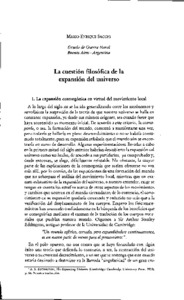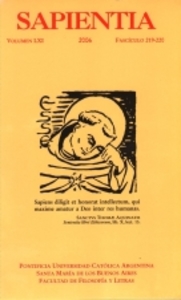Por favor, use este identificador para citar o enlazar este ítem:
https://repositorio.uca.edu.ar/handle/123456789/12121| Título: | La cuestión filosófica de la expansión del universo | Autor: | Sacchi, Mario Enrique | Palabras clave: | COSMOGONIA; UNIVERSO; MOVIMIENTO; MATERIA; TEORIA DE LA RELATIVIDAD; ESPACIO; CREACION | Fecha de publicación: | 2006 | Editorial: | Pontificia Universidad Católica Argentina. Facultad de Filosofía y Letras | Cita: | Sacchi, M. E. La cuestión filosófica de la expansión del universo [en línea]. Sapientia. 2006, 61 (219-220). Disponible en: https://repositorio.uca.edu.ar/handle/123456789/12121 | Resumen: | Resumen: En la primera mitad del siglo xx, diversos astrónomos y cosmólogos
propusieron la teoría de la expansión uniforme del universo. Las investigaciones debidas a Friedmann, Hubble, Humanson, Lemaltre y otros
autores se destacaron sosteniendo tal teoría. Pero todos estos estudiosos
sostuvieron una interpretación cosmogónica de la expansión del universo
basada solamente en la observación del movimiento local, particularmente de las galaxias. El principal problema de su interpretación reposa en la
inexistencia de un espacio vacío adónde dichas galaxias se expandirían,
pues el mismo universo contiene todos los lugares no existiendo ningún
otro en nuestro mundo natural que pueda ser ocupado por otros cuerpos,
ya ínfimos, ya los más enormes. Mas es evidente que el universo parece
expandirse, de donde es menester conocer cómo la filosofía pueda salvar
las apariencias de su movimientro expansivo. En este artículo se trata de
salvar tales apariencias, pero, en adición al movimiento local, aquí se sostiene que el universo también se expande a través de otras clases de movimientbs; e. gr., la generación y el aumento. Además, una expansión del
universo hacia un espacio vacío infinito es rechazada por imposible. Por
fin, el artículo concluye con la afirmación de la condición creada de la
materia primera, algo que no se puede estudiar dentro de los límites de las
ciencias positivas, pues es un expediente reservado exclusivamente a la
metafísica y a la teología sagrada. Abstract: In the first half of the 20th century, several astronomers and cosmologists propose the theory of the uniform expansion of the universe. Researches due to Friedmann, Hubble, Humanson, Lemal-tre and other authors stand out in maintaining such a theory. But all these academics upheld a cosmogonic interpretation of the expanding universe based only in the observation of local motion, particularly of galaxies. The main problem of their interpretation lies in the non existence of an empty space where those galaxies can expand themselves, for the universe itself contains all places and no other ones exist out of our natural world to be occupied by other bodies, whether the littlest one or the now the huge one. But it is evident that the universe seems to expand, so that it is necessary to know how philosophy can save the appearances of its expansive motion. In this article we try to save these appearances, but in addition to the local motion, we also hold that the universe also expands by means of other kinds of motions, viz. generation or coming to be and increase. Furthermore, an expansion towards an infinite empy space is plainly rejected as impossible. The paper finishes with an affirmation of the created condition of prime matter as something which cannot be studied within the limits of positive sciences, because it is an expedient reserved to metaphysics and sacred theology exclussively. |
URI: | https://repositorio.uca.edu.ar/handle/123456789/12121 | ISSN: | 0036-4703 (impreso) | Disciplina: | FILOSOFIA | Derechos: | Acceso abierto | Fuente: | Sapientia. 2006, 61 (219/220) |
| Aparece en las colecciones: | SAP - 2006 Vol LXI nro. 219-220 |
Ficheros en este ítem:
| Fichero | Descripción | Tamaño | Formato | |
|---|---|---|---|---|
| cuestion-filosofica-expansion-universo.pdf | 195,05 kB | Adobe PDF |  Visualizar/Abrir | |
| sapientia219-220.pdf.jpg | 25,57 kB | JPEG |  Visualizar/Abrir |
Visualizaciones de página(s)
604
comprobado en 30-abr-2024
Descarga(s)
721
comprobado en 30-abr-2024
Google ScholarTM
Ver en Google Scholar
Este ítem está sujeto a una Licencia Creative Commons

